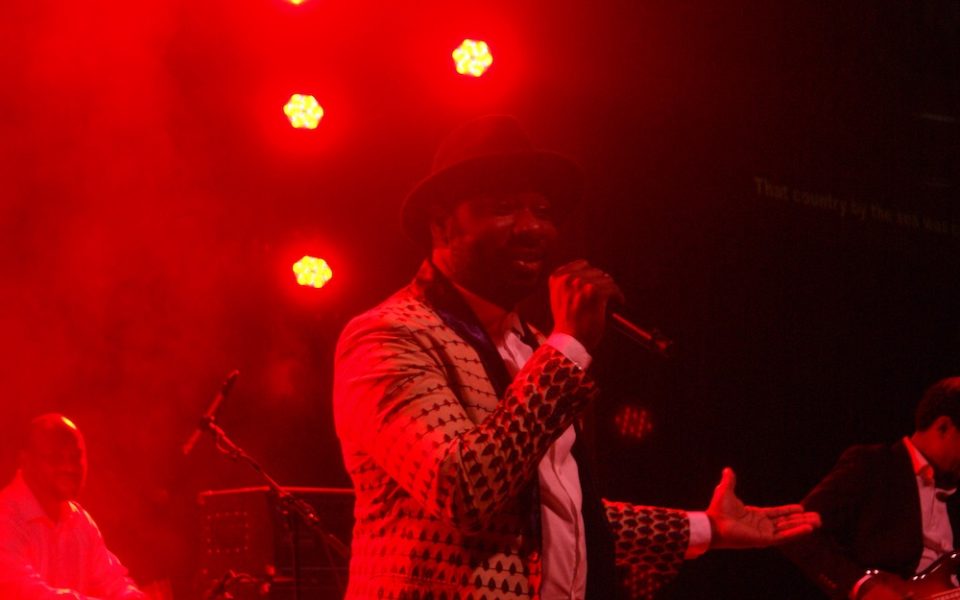On June 19, 1865, three years after the Emancipation Proclamation, Union troops landed in Glaveston, Texas to snuff out the last remnants of Confederate hegemony. This day would become known as Juneteenth, a holiday that celebrates the end of slavery in America.
One hundred and fifty years later, the descendants of those slaves still face the ripple effects of generational trauma caused by ongoing, systemic injustice. How can a group of marginalized people cope with such trauma? Some look to art.
Last Thursday and Friday, Artists Unite 2019 celebrated Juneteenth by hosting several black artists to share and discuss their work at Ramkat in Winston-Salem. The event sought to build community through art by giving artists of color a platform and voice to work through their experiences of societal injustice.
LB the Poet, a Winston-Salem native, and Ghanaian born Blitz the Ambassador, were two of the four artists who took part in the two day event.
On Thursday, the event proved to be more academic, showcasing artist’s work followed by Q&A sessions with the crowd. LB shared some of his spoken-word pieces while Blitz screened his feature film The Burial of Kojo. Friday was filled strictly with performances, with LB sharing more of his poetry and Blitz performing onstage with his band.
“It all begins with representation,” said Blitz on the first night, commenting on different aspects of his film.
He spoke about how his grandmother used to keep him entertained with stories as a kid when their home’s electricity would go out.
“I remember as a child… the characters [in her stories] were nonlinear,” he said. “[They] came and went. Night to night there was a different character, but it was the same character… sometimes as a bird, a person and object. I’ve known this kind of storytelling to be truly one that hasn’t been represented in the western canon of [cinematic storytelling]…. I still remember these stories; I know they’re powerful and I know they deserve a platform.”
The Burial of Kojo tells the tale of a Ghanaian family while exploring themes of trauma and emotional suffering that are passed down like ailments such as high blood pressure or alcoholism. The cyclical nature of the film’s narrative parallels the progression of suffering endured by the descendants of American slaves. The film shows how Esi, the daughter and narrator, overcomes the death of her father by telling her story for a small group of people in a library. Through the art of storytelling, Esi is able to confront her fear, much like how the artists at the Ramkat confront social injustices through their respective artforms.
LB chooses to direct his creative outlet through verse.

“I’ma go/ I’ma Give Options/ I’ma go/ I’ma Gift Offering/ No/ I’ma Give Originality/ I’m always on go mode/ Going Out Making Other’s Destiny Excellent,” he spit on the second night of Artists Unite. His lines outline how he’s chosen to build his community through his art. He’s a man who knows he’s not an island; he’s a piece of the continent, a part of the main.
“I started writing poetry in the sixth grade,” he said. “My principal [spoke with me] the day after my grandmother passed. I would not speak, I could only cry. She told me exactly what I tell my students: Write down all of your feelings in this pad and no one can ever judge you off of what you put into [that pad.]”
Solomon Quick, who directs a summer camp at the MLK Community and Recreation Center in Winston-Salem, attended both nights of the event. After the screening and Q&A for The Burial of Kojo, Quick asked Derrick Young, co-organizer of Artists Unite, if Blitz could come and speak with the kids at his camp the next day.
“The theme for our camp this year is Afrofuturism and the seven principles of Kwanzaa,” said Quick. “We want to introduce them to things where they can think of a world beyond racism, classism and the aftereffects of colonialism where their opportunities are limitless.”
On Friday, after the kids at Quick’s camp had their lunch, Blitz made an appearance.
“I talked with the kids about Afrofuturism,” said Blitz. “I explained it in a way that children could understand.”
By building meaningful connections, Artists Unite provides a platform to artists of color so that they can build their community in their own way.
“It’s been a 10-month journey,” said Tommy Priest, organizer of the event. “[and we brought] artists together to move systems and change the ills of the world…. The artists can teach us.”
The Burial of Kojo is available to stream on Netflix.
Join the First Amendment Society, a membership that goes directly to funding TCB‘s newsroom.
We believe that reporting can save the world.
The TCB First Amendment Society recognizes the vital role of a free, unfettered press with a bundling of local experiences designed to build community, and unique engagements with our newsroom that will help you understand, and shape, local journalism’s critical role in uplifting the people in our cities.
All revenue goes directly into the newsroom as reporters’ salaries and freelance commissions.


Leave a Reply